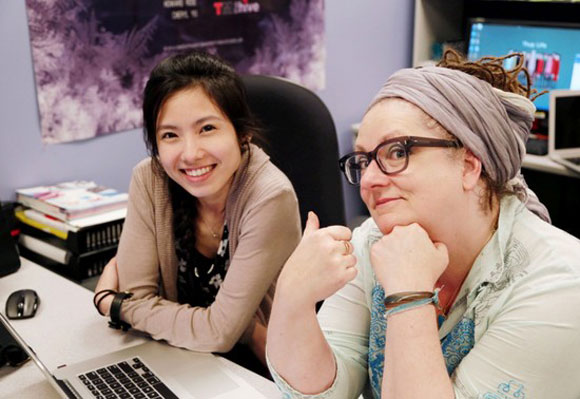

Cheryl Yu and professor Diane Gromala in the SFU Pain Studies Lab. Photo courtesy of SFU.
This article by Marianne Meadahl originally appeared in SFU News. Reposted with permission.
Video games may be good entertainment, but Cheryl Yu is creating a game that serves a different purpose.
Merging her passion for technology with the goal of producing alternative pain management solutions, she has developed Mobius Floe, a game to distract users such as burn patients and those suffering chronic illnesses from their persistent physical pain.
Still in the early stages of development, Mobius Floe draws the patients’ focus away from their pain and into a virtual environment.
The idea is to constantly present the patients with a captivating world that requires their constant attention, a strategy referred to as ‘pain distraction.’
Working in SFU’s Pain Studies Lab with Diane Gromala, a professor in the School of Interactive Arts and Technology (SIAT), Yu researched and implemented game design concepts. She also experimented with different kinds of virtual reality games for reducing patients’ chronic and acute pain.
“Being part of the Pain Studies Lab, it felt more purposeful because we were developing the project to help people suffering from a health condition,” says Yu, an Undergraduate Fellowship Award recipient in the Faculty of Communication, Art and Technology.
The award provided her the opportunity to work with and learn from industry professionals. And with Gromala’s contacts in the health field, she has found patients willing to test out her ideas.
“If a video game can be designed to be intensely engaging enough for people who have persistent pain and a host of other medical problems, imagine how captivating it will be for healthy people,” says Gromala.
“Cheryl was able to adapt to the rigors of research in a very challenging area that is full of uncertainties. She has exactly the kind of innovative thinking, adaptability and hard-core work ethic that are necessary for success in high-tech jobs.”
Yu, who graduates this month with a bachelor of arts, with honours, hopes to land a job in the video game industry. While competition is stiff, she believes the skills she has already honed as a SIAT student researcher will be transferable beyond the lab.
Related Articles
GRAND Health Theme (led by Dr. Diane Gromala)
Confronting Virtual Reality: An Undergrad Research Experience
Confronting Pain project basis for new Chronic Pain Research Institute at Simon Fraser University